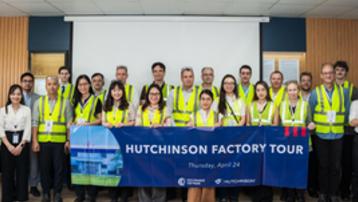Navigating International Recruitment

Successful companies need experienced leaders. These are people who know their business inside-out and have a strong understanding of their sector. But, more than that, experienced leaders also draw on best practice, innovation, and insights from around the world. For this reason, international enterprises often recruit foreign managers to lead their operations here in Vietnam.
What are the latest updates on recruiting international profiles? What information do you need to know?
There were over 100,000 foreign nationals working in Vietnam as of April 2021, according to government figures. Over half (58 per cent) of these workers were classified as ‘experts’. Meanwhile, eight per cent were here in Chief Executive roles and a further 12 per cent as ‘managers’.
This does not just benefit individual companies. It also has the added advantage of helping to train and up-skill the local workforce. Foreign managers can share their knowledge and experience with their teams. This, in turn, can help to develop the next generation of Vietnamese entrepreneurs and business leaders.
From a 'low-cost manufacturing hub' to the development of national leaders

However, Vietnam is moving up the value chain. Thanks to the landmark Doi Moi reforms of 1986 and decades of almost uninterrupted economic growth, Vietnam was declared a ‘lower-middle-income’ nation in 2010. It has now set its sights on becoming a ‘developing upper-middle-income’ state in 2030 and a ‘high-income’ nation in 2045.
No longer just a low-cost manufacturing hub, Vietnam is now cultivating national champions and becoming more integrated with global value chains through international trade deals such as the EU-Vietnam Free Trade Agreement. Not content to be the ‘workshop of the world’, the government is reforming the legal framework to better align it with international standards and to ensure that more local staff can take up senior leadership positions in multinational companies. Following these legal changes, it is becoming more difficult for foreign enterprises to recruit and retain international staff to lead their companies in Vietnam.
Entry into force of Decree 152

In 2021, Decree 152 entered into force. In doing so, it introduced stricter criteria for companies wishing to hire a foreign manager, expert, or technician. First of all, Decree 152 states that work permits cannot be renewed more than once. Therefore, once the first renewal expires, the enterprise will have to start from scratch and prove that it requires a foreign worker for a particular position. Meanwhile, work permits issued under previous regulations can no longer be renewed. Once again, if an enterprise wishes to retain a member of their staff granted a work permit under the old rules, the entire process will need to begin from square one.
Second, according to Decree 152, work experience gained in Vietnam will no longer count towards a new work permit. Under previous regulations, for instance, if a foreign worker had held a managerial position in Vietnam, this would count towards the experience required for a new work permit. However, under new regulations, this will no longer be the case. In other words, a foreign worker might have held a senior leadership position in Vietnam for more than a decade. But, to get a new work permit, this same worker will have to use the experience gained in their home or other countries to prove their qualification for continuing in the same job in Vietnam. This can be difficult to prove if their previous companies are no longer in business.

And, third, Decree 152 stipulates that degree certificates will now need to match the job description of the foreign worker. For instance, someone who studied finance or accounting but then went on to build a long and distinguished career in another field – such as marketing or logistics – will no longer be qualified to continue that career in Vietnam, despite their decades of experience.
These restrictions were scaled back for a time during the fourth-wave Covid-19 outbreak. Resolution 105, issued in September 2021, was designed to ease some of the requirements of Decree 152 and support businesses during the pandemic. Following Resolution 105, authorities were given some discretion in cases where a degree certificate does not match a job description. Likewise, professional experience in Vietnam was allowed to be counted as evidence that a candidate is qualified for a new work permit.
International business communities welcomed Resolution 105. However, it was a short-term sticking plaster, not a permanent solution. Now the pandemic is back under control, Decree 152 is back in force. And the complicated, time-consuming document legalization process remains a challenge for both companies and staff alike.
In short, the direction of travel is clear. In the future, foreign companies will be under greater pressure to prove that a particular leadership position requires an international rather than a domestic hire. Therefore, it has never been more important to keep up-to-date and compliant with the latest regulations around work permits for foreign staff in particular and labour laws in general.
This article is part of CCIFV magazine "Connect #10 : Well-being : the key to productivity and retention?"

Keep up to date with the latest HR information
Join the CCIFV's Human Resources sector committee to exchange ideas with our business community and access the most relevant information.
Learn more
![[Translate to Anglais:] [Translate to Anglais:]](http://aws-a.medias-ccifi.org/fileadmin/_processed_/7/5/csm_gridasia-viglacera-bac-ninh-pers0220231214195526_92c824cbbd.jpg)
